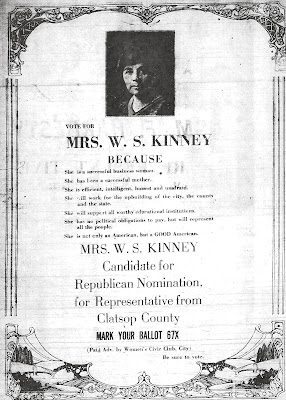Kinney ran as a Republican in the May primary and won the field in this first election after the First World War. Oregon women had been voting since the 1912 achievement of suffrage and the Nineteenth Amendment would pass in August 1920.
Her campaign advertising emphasized a variety of qualities to appeal to her constituency: she was a successful businesswoman and mother, would work to support Astoria, Clatsop County, and Oregon, and was free of "political obligations" so she could represent "all the people." And, in the postwar climate of fears about radicalism that Lovejoy and other candidates also had to face, Kinney was "not only an American, but a GOOD American."
As with other Oregon women candidates, Kinney gained support (and advertising dollars) from organized women. In Astoria the Women's Civic Club had formed after women achieved the vote with the particular purpose of studying legislation and working to make their new civic power a reality. The Civic Club members who paid for Kinney's campaign ad for the May primary also chose a frame of trees, fountains and flowers.
"Vote for Mrs. Kinney," Morning Astorian, May 21, 1920, 4.
Kinney won election that year and was a sponsor of legislation for women's jury service (more on this topic in future posts). She won election to the Oregon Senate in 1923 and 1925.




